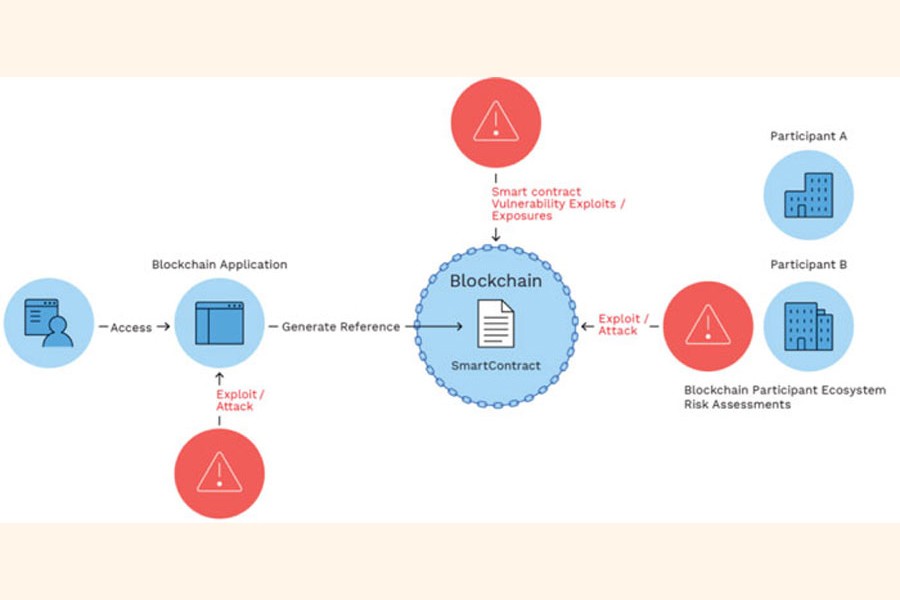Challenges of integrating blockchain technology into existing systems

Published :
Updated :

Blockchain is not a complete solution by itself. Rather linking it with Fourth Industrial Revolution (4IR) technologies and internet of things (IoT) will ensure greater impact. This is why cooperation among decision-makers, strategists, regulators, developers, lawyers and area specialists is required to ascertain maximum gain from this technology. Only under such circumstances the technology will drive sustainable value addition to business organisations.
HURDLES THAT NEED TO BE OVERCOME: Blockchain applications need to be able to roll out efficiently in order to attain extensive industry and user-level acceptance.
Lack of user friendliness is a problem for blockchain technology. Many existing interfaces for blockchain ledgers are complex for adoption.
Specific areas like user experience, system efficiency and the lack of formal blockchain protocols need to improve.
The degree to which users trust and understand the technology could also prove to be a barrier to adoption.
Unless these challenges are addressed, such platforms will not grow sufficiently enough to raise capital at the scale needed to become effective.
An inability to handle a large number of users and rapidly process large numbers of transactions could limit the adoption of blockchain in global decentralised energy systems. Today, public blockchains such as Bitcoin and Ethereum can handle only between 3 and 30 transactions per second. In comparison, visa circuits can handle about 60,000. A blockchain platform would need to be able to handle millions of transactions per second.
Blockchain is said to be hacker-proof due to the complex cryptography and the distributed nature. However, all information technology (IT) systems are subject to cyber security risks, and blockchain is no exception.
By design, blockchain ledgers generally share more data with other participants than traditional centralised databases, as data needs to be shared, often equally, among multiple peers. However enterprises cannot afford to expose private data publicly for either legal or competitive reasons. To overcome this paradox, access to most blockchain ledgers requires both a public and a private key. Since it is essentially impossible to access data within a blockchain without the right combination of public and private keys, this represents the strength of the system. There is also a shortcoming as all a hacker needs are to obtain the right keys to access the data. Protecting these keys is a factor heavily dependent on the individual user storing and processing them. This can be intimidating for users inexperienced with the technology.
INTEGRATING BLOCKCHAIN TECHNOLOGY INTO EXISTING SYSTEMS: Since blockchain is not a separate technology, its seamless integration with other IT systems will be a challenge. Given the early stages of blockchain development, it is obvious that there are no concrete blockchain standards. While the standards are still being developed within each platform, the interoperability between platforms and with other IT systems is currently extremely limited and often non-existent. So it raises a costly operational challenge to set up suitable data models and blockchain-enabled business processes to incorporate new authentication and communication protocols. Integrating blockchain-based traceability applications with existing management systems will be costly and complex.
While considering wider socio-political economic challenges, it is important for all stakeholders to consider how changes might feed through to the economy and society, in addition to wider trust issues regarding data privacy and security.
Multi-stakeholder dialogues will be crucial for piloting high levels of expected change, building trust and identify and managing unintended and unforeseen consequences.
It will be important for companies and developers to actively inform the regulatory landscape and help to shape standards. This includes working together via industry bodies such as Global Digital Finance, which is working towards a harmonised set of standards (the global code) and practices for the cryptocurrency space and/or engaging directly with governments and regulators at the national level on needs in regard to blockchain governance and public-private partnerships.
Crypto-relevant industry bodies such as Global Digital Finance should also look to embed sustainability considerations into the emerging industry code of conduct and principles, as World Economic Forum has said recently.
In the case of Bangladesh, which is one of the top five fastest growing economies, blockchain can act as an accelerator for sustainable growth. The country has enjoyed a staggering 6.0 per cent average annual growth since the last decade reaching up to 7.85 per cent recently. Its biggest export sector is readymade garments, which holds the second position in the world, after China. Keeping an eye on the advancement of blockchain technology and adapting quickly to it can prove beneficial for sustainable growth of Bangladeshi exports.
Already some private financial organisations are assessing blockchain implications at small scale. This is a good sign. Being an emerging economy Bangladesh should utilise opportunities emerging out of blockchain research being conducted in countries like USA, China, Australia, Japan, UK and India.
At the micro level, a properly planned approach is required to leverage the maximum benefits of blockchain technology. While investing on it, organisations must consider their strategic alignment with transformation. Otherwise unstructured implementation can lead to failures. Therefore it is recommended that companies evaluate at the user-case level to determine whether implemented application can be useful for them with blockchain technology. Impact analysis should also be done rigorously to monitor progress at regular intervals.
Al Fattah Md. Azim is currently working at a multinational supply chain and logistics company.


 For all latest news, follow The Financial Express Google News channel.
For all latest news, follow The Financial Express Google News channel.